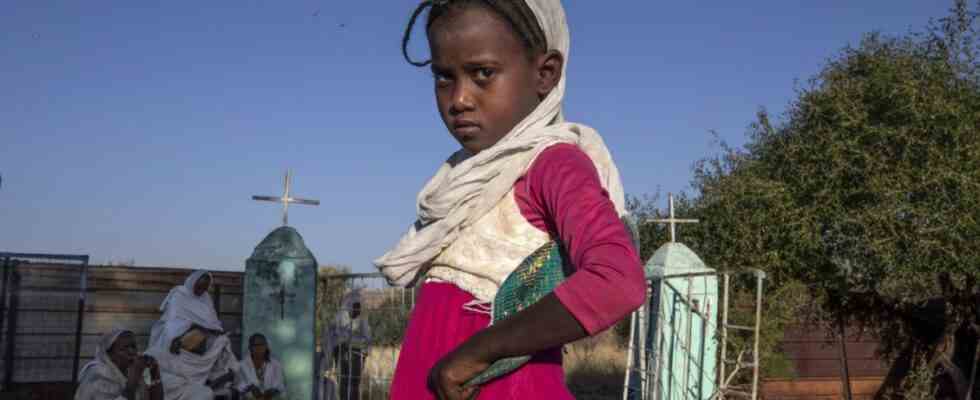If you look at what Prime Minister Abiy Ahmed is circulating on his Twitter channel these days – you could get the impression that Ethiopia currently consists primarily of blooming landscapes, of a new beginning, optimism and happiness. Abiy visits a banana plantation, lush wheat fields just before the harvest, he inaugurates a library and is cordial in conversation with heads of state from the region.
Abiy seems to be moving in a kind of parallel world, large parts of his country are in what is possibly the worst war in the world – but which that world largely ignores just as much as the prime minister on his Twitter profile.
Ethiopia and Eritrea report land gains
Hundreds of thousands of soldiers are facing off in the north of the country in a conflict that is closed to the public. Journalists are not allowed to travel to the war zone, and telecommunications are cut off. Tens of thousands of people are said to have died since November 2020, millions of people are fleeing or are dependent on food aid, which does not reach the conflict region sufficiently.
Peace talks, moderated by the former presidents of Kenya and Nigeria, are scheduled to begin on Monday in an undisclosed location in South Africa. But the hopes are limited. The Ethiopian federal army led by Abiy Ahmed had recently reported significant gains in territory with the allies from Eritrea. His security advisor agreed to the talks, but at the same time criticized the few states that still call on Ethiopia to refrain from atrocities against the civilian population and spoke of “false accusations”.
The murders, kidnappings and rapes are well documented. Ethiopian and Eritrean soldiers are said to have recently executed 46 civilians in the village of Shimblina in the Tigray region. It’s a horrifying glimpse of what may be to come. The aim of Abiy and Eritrean President Isaias Afewerki, who is allied with him, is apparently the complete “destruction” of the opponents in Tigray, as Abiy once said. He doesn’t sound like he sees much room for negotiation.
Hunger as a weapon
For Abiy, it is a struggle for Ethiopia’s territorial integrity and future power center in Africa’s second most populous country. The Tigray are only a small minority of the approximately 120 million Ethiopians, but for many decades they were the elite in the multi-ethnic state. When Abiy took office in 2018, a representative of the largest group, the Oromo, came to power for the first time and announced that they wanted to curtail the powers of the individual states. The Tigray, offended, retreated north, held illegal elections, and attacked the federal army. The conflict escalated.
Abiy brought large parts of Tigray under his control, then the opponents fought back and marched to about 200 kilometers from the capital Addis Ababa, now everything is turning again. Both sides have repeatedly admitted, at least indirectly, that there is no military solution to this war, but they are still looking for one. Eritrea has called a mobilization, the troops of the neighboring country are accused of particularly brutal crimes against the civilian population.
For Eritrea’s President Isaias Afewerki, revenge is probably the main motive for taking part in this war. For 20 years he fought with Ethiopia in a fight over a few desert beetles, on the other hand, the Tigray commanded the archenemy’s troops at the time. There will be no peace without Isaias, but he is not at the table when peace negotiations are taking place in South Africa.
Anti-war protesters gather outside the African Union headquarters in Addis Ababa on October 4.
(Photo: AMANUEL SILESHI/AFP)
There is only “a very small window of opportunity to prevent genocide,” said Tedros Adhanom Ghebreyesus, Secretary-General of the World Health Organization (WHO), a few days ago. “There is no other situation in the world where six million people are being held under siege for almost two years.” Tedros himself comes from the Tigray region and served the authoritarian regime for a long time as a minister – Abiy sees him as part of the old power clique that needs to be eliminated. On this point, however, many Tedros are right.
The United Nations accuses Abiy of using hunger as a weapon, the Tigray region is largely cut off from aid, trade, transport, banking services, electricity and telecommunications are all cut off, although Abiy has repeatedly promised to loosen the stranglehold.
His actions have so far remained largely without consequences, European diplomacy repeatedly sends out press releases expressing the “concern” of the EU, German Foreign Minister Annalena Baerbock ignores the war, although the fate of the tens of thousands of women who were murdered or raped is actually unknown should be at the top of their “feminist foreign policy” list.
Unesco has just determined that in Ethiopia, due to the war, around 45 percent of the students are not going to school, one of the worst figures in the world. At the same time, the Ministry of Education collected several million euros for the war, which should actually be there for education. Some of the money could come from western donors like Germany. The Europeans “should warn Ethiopian Prime Minister Abiy Ahmed and Eritrean President Isaias Afewerki of criminal consequences if their troops attack civilians during their advance in Tigray,” says the think tank Crisis Group. Nothing has happened so far.

